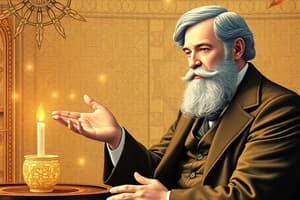Podcast
Questions and Answers
What main goal did Andrew Carnegie pursue after retiring from active business?
What main goal did Andrew Carnegie pursue after retiring from active business?
- To invest in other industrial ventures.
- To create a new steel corporation.
- To find practical ways to give away his fortune. (correct)
- To establish an educational institution.
Who did Andrew Carnegie choose to help organize his philosophy of Individual Achievement?
Who did Andrew Carnegie choose to help organize his philosophy of Individual Achievement?
- Cyrus H.K. Curtis
- Henry Ford
- Thomas Edison
- Napoleon Hill (correct)
What was the outcome of Carnegie's collaboration with successful men in various fields?
What was the outcome of Carnegie's collaboration with successful men in various fields?
- The establishment of a new steel company.
- The publishing of a biography.
- A comprehensive philosophy of achievement. (correct)
- A series of educational programs.
Which prominent leader's career did Napoleon Hill analyze as part of Carnegie's philosophy?
Which prominent leader's career did Napoleon Hill analyze as part of Carnegie's philosophy?
How many successful men contributed their experiences to Carnegie's philosophy?
How many successful men contributed their experiences to Carnegie's philosophy?
What did Carnegie believe was his greatest riches?
What did Carnegie believe was his greatest riches?
Which of the following was NOT one of the contributors to Carnegie's philosophy?
Which of the following was NOT one of the contributors to Carnegie's philosophy?
What was the primary focus of the philosophy developed with Carnegie's philosophy?
What was the primary focus of the philosophy developed with Carnegie's philosophy?
Which of the following phrases best illustrates Carnegie's approach to philanthropy?
Which of the following phrases best illustrates Carnegie's approach to philanthropy?
What does the term 'philosophy of Individual Achievement' refer to in Carnegie's context?
What does the term 'philosophy of Individual Achievement' refer to in Carnegie's context?
Flashcards
Carnegie's Motivation
Carnegie's Motivation
Carnegie wanted to share the philosophy behind his wealth accumulation with the public.
Napoleon Hill's Role
Napoleon Hill's Role
Hill was chosen to organize Carnegie's business experience into a philosophy of success.
Collaborative Philosophy
Collaborative Philosophy
Carnegie enlisted many successful business leaders to contribute their experiences and principles.
Ford's Influence
Ford's Influence
Signup and view all the flashcards
Philosophy of Achievement
Philosophy of Achievement
Signup and view all the flashcards
Carnegie's 'Real' Fortune
Carnegie's 'Real' Fortune
Signup and view all the flashcards
World's First Practical Achievement Philosophy
World's First Practical Achievement Philosophy
Signup and view all the flashcards
Collaboration (Examples)
Collaboration (Examples)
Signup and view all the flashcards
Carnegie's Legacy
Carnegie's Legacy
Signup and view all the flashcards
Successful Business Leaders
Successful Business Leaders
Signup and view all the flashcards
Study Notes
Andrew Carnegie's Philosophy of Individual Achievement
- Carnegie retired from business to invest in philanthropic endeavors.
- He recognized his financial success was tied to the principles he used to build it.
- Carnegie sought a collaborator to organize his experience into a philosophy.
- He chose Napoleon Hill to document this experience.
Napoleon Hill's Role
- Hill was tasked with formulating "The World's first practical philosophy of achievement".
- Carnegie recruited numerous successful business leaders.
- Over 500 prominent figures (living and deceased) contributed.
- This included: Henry Ford, Cyrus H. K. Curtis, F. W. Woolworth, Theodore Roosevelt, and many others.
Henry Ford's Contributions
- Carnegie first directed Hill to study Ford's life for the philosophy.
- Ford's entire career was meticulously studied and incorporated.
- Ford's principles were analyzed for application to other fields.
- The portion of the philosophy based on Ford's achievements is considered crucial for success.
Studying That Suits You
Use AI to generate personalized quizzes and flashcards to suit your learning preferences.





